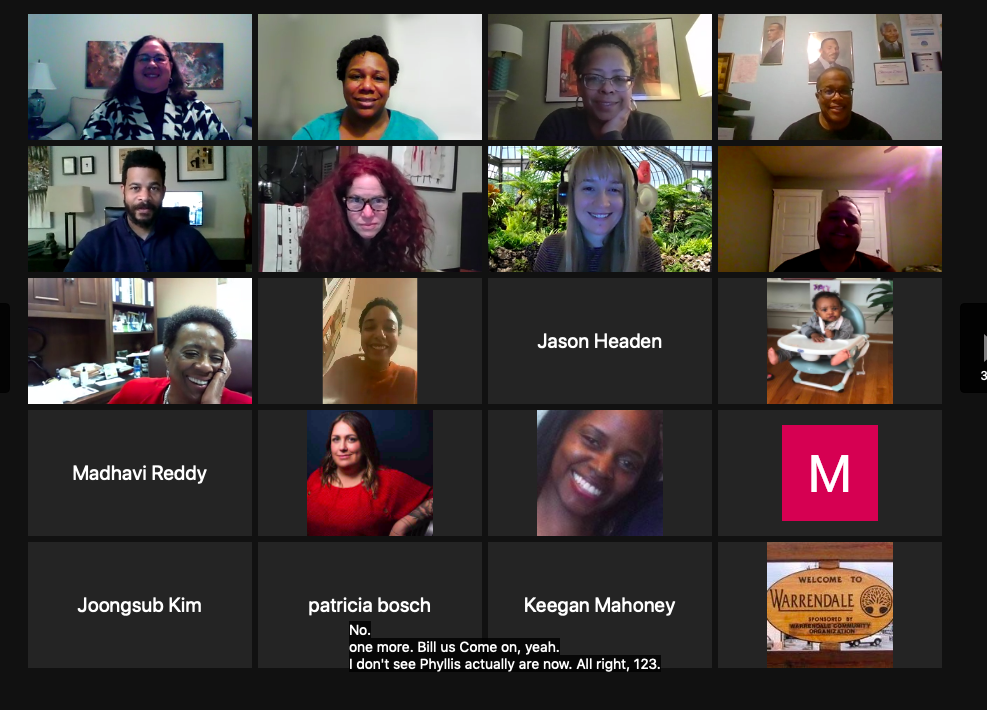2019–2020-2021 Structure and Process
1.
2019–2021 System Governance: Forming the System Coordination and Oversight Entity
 |
System Governance Element:
|
- Coordinating and aligning all the system elements
- A collaborative community development structure among organizations in neighborhoods and across the City.
BECDD Steering Committee
14+ Community Development Stakeholders:
- 6 CDOs
- 4 Intermediaries
- 2 Funders
- 1 City Government Official
- 1 University
- Other Stakeholders
- Oversaw the BECDD Phase 3 System Building Process
- Determining the Oversight Structure and Accountability Process
2.
2019–2020 BECDD ACTIVITIES
System Projects: Monitoring, Guidance, and Compilation of Learnings Through the Testing of 2018 Task Force Recommendations by 5 Stakeholder Implementation Teams
2020–2023
Leading to These Outcomes
- COMMUNITY DEVELOPMENT CAPACITY BUILDING DELIVERY SYSTEM: development and testing
Implementation team:
- CDAD
- Co.act
- Enterprise
- MCR
|
|
Capacity Building & Certification Element |
2020–2023 Outcomes:
- Collaborative group of capacity building providers
- Certified, high-capacity CDOs and strong GROs in every neighborhood
- NEIGHBORHOOD VOICE AND ADVOCACY FRAMEWORK: testing in two neighborhoods
Implementation team:
- CDAD
|
|
Neighborhood Voice & Advocacy Element |
2020–2023 Outcomes:
-
Citywide structure to articulate neighborhood priorities
- NEIGHBORHOOD VITALITY INDEX: articulating and advocating
Implementation team:
- Data Driven Detroit
- JFM Consulting Group
|
|
Data & Evaluation Element |
2020–2023 Outcomes:
- “Neighborhood vitality” progress measurement system in play in partnership with city government
- Universal access to neighborhood data with technical assistance to collect it, acquire it and use it
COMMUNITY DEVELOPMENT LEADERSHIP PIPELINE: development and testing
-
Youth in Community Development Consortium
- Detroit Public Schools Community Development Partnerships
-
Community Development Career Navigation Portal
- Community Development Middle and High School Curriculum
- Community Development Competency Framework
-
Community Development High School and Higher Ed Academic Tracks
-
Workplace Learning Partnerships
Implementation team:
- Cody Rouge Community Action Alliance
- Congress of Communities
- Eastside Community Network
- Urban Neighborhood Initiatives
|
|
Education & Career Pipeline Element |
2020–2023 Outcomes:
- Community development certification academic tracks with a career navigation system
- Strong pipeline of community development professionals
At least one CITY-CDO PILOT PARTNERSHIP- REBUILDING HOME TOGETHER — development and testing
Implementation team:
- 8 CDOs w/ CHN Housing Partners, DLBA, Cinnaire
- Bridging Communities, Inc
- Central Detroit Christian CDC
- Eastside Community Network
- GenesisHOPE CDC
- Grandmont Rosedale CDC
- Joy Southfield CDC
- Osborn Neighborhood Alliance
- U SNAP BAC
|
|
City Engagement Element |
2020–2023 Outcomes:
- Institutionalized City-CDO partnerships
3.
System Resources: Continuing Research, Design and Strategy on How to Organize and Resource the System
 |
System Capitalization Element:
|
- A sustainably resourced community development system with public and private sources and some systemic revenue streams
2021 Structure and Process
- The BECDD Steering Committee is participating in a process with the CDAD Board, of embedding and integrating its work into CDAD as its institutional host.
- The BECDD System Capitalization Task Force — including its “Funders Discussion Group” — is working closely with, and reporting to, the Steering Committee on creating a 10-year strategy to sustainably resource the system
- The Task Force is sponsoring a series of “Alignment Forums” in 2021, to bring stakeholders together to look at the various elements of community development and how funding can be better aligned for more impact.

Photos from February 23 Alignment Forum Seeking Alignment in Detroit: How Do We Get to Equitable Development Together?


- The 5 BECDD Projects – each associated with one or more of the System Elements – continue to move forward in various stages of design and pilot testing.
- Most of these BECDD Projects Teams have engaged with a stakeholder group (a workgroup, a task force, focus groups), to assure that BECDD stakeholders remain engaged and influential in shaping these projects.
- Together, the key BECDD stakeholders are working together to identify resources to invest in all seven elements of this coordinated system – not just separate projects – to have a real impact on all Detroit neighborhoods.
- By the end of 2022, we hope that the building of the system – including all seven elements – will be finished, with a seamless community development system that impacts all of Detroits neighborhoods.










